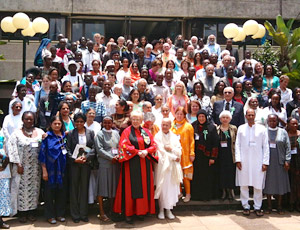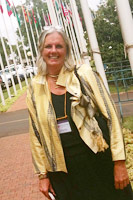Report on Global Peace Initiative
of Women’s 10th Anniversary Celebration
at UNEP World Headquarters in Nairobi – March 2, 2012
“Responding to the Cry of the Earth and the Human Community
– From the Heart of Africa”
(Organized by GPIW & The Gallman Memorial Foundation)

The Work of Global Peace Initiative of Women (GPIW): “During these past twelve months we organized dialogues on four continents – Asia, Africa, Europe and North America. Over the years we have heard from our participants the growing recognition of the link between climate change and the economic systems now in place, and the growing strain this places on the Earth and human communities.” From GPIW Annual Review 2011
Setting the Context: “The degradation of the natural world and the pain humans inflict upon each other came from the same cause; they are manifestations of the same mindset, one dominated by the need for control, driven by competition, greed and self interest…. We have been living in a construct of conflict – with nature and each other.” (Excerpts from the Program)
NOTES FROM THE MEETING
Gathered by Alison M. Jones

(These are my random excerpts from the many wonderful discussions and speeches, with heavy emphasis by me on comments focused on the environment. Because these notes are inexact and out of context, and because I didn’t ask permission to quote the speakers, I’ve only attributed recorded thoughts of a few who were key speakers and for whom I have enough notes to provide somewhat of a context. The order of the notes is the order in which they were heard.)
Our environment is greatly depleted. First we need to apologize, then we can find solutions.
We can’t improve and protect the world as responsible custodians unless we have peace between every person and their fellows.
The human community is at war not only with each other but with the earth. It’s one war. It’s an internal war. We are at war with ourselves.
Excerpts from Kuki Gallman’s address:
War has caused much suffering and degradation, including the poisoning of water systems and our environment. Now we are facing an environmental holocaust of forests, elephants, rhinos, and other gifts of Nature.
Environmental degradation is linked to poverty and social disintegration. Peace with the environment must come first – before peace with each other. Earth is our mother. What happens to her children will be determined by us, the children of the earth.
Kenyan women now understand they can endure their husband’s beating for voting if it means they are voting to ensure their children’s future
Stirring grassroots interest and understanding people’s primary need for water and food is the key to conservation. The fiscal value of wildlife tourism must be felt in the homes of the local people or conservation won’t work.
Excerpts from Welcoming Remarks by Achim Steiner, Executive Director of UNEP:
We must remember that the cause of environmental degradation is not always greed or ignorance – rather it’s often desperation and poverty. As Indira Ghandi first said, “Poverty is the cause of the degradation of the enviroment.”
A green economy must go hand in hand with poverty reduction. The big question is how will we feed each other when three-fourths of Africa has no electricity? By 2020 one third of the global population will be living in water-scarce regions.
Recognizing that Kenya’s new constitution binds the government and Kenyans to achieving a change of forest coverage from less than 1.2% of closed forest cover to at least 10%, Kenya must adopt wind, solar and geo-thermal energy alternatives. It is great that the Kenya Army has a group of “environmental soldiers” who are trained in tree planting.
Proper wildlife management will sustain and enrich Kenyans. However mis-management will ruin Kenya’s economy.
Remarks from Her Highness Shinso Ito, Buddhist Master from Japan who has worked with 2011 tsunami victims:
We can share our sadness and diminish it. We can share our joy and enhance it. When suffering from Nature’s storms, we must remember we are also nourished by Nature in many ways.
We have believed that more consumption creates stronger economies and greater wealth. However we now need to focus on sustainable wealth – our communities, our families. We must start reusing and recycling water.
When we cherish Nature, Nature will cherish us. We must learn that acknowledgement of ultimate truths will relate to human desires. It’s short-sighted cravings that create problems. We must change our desires for the better – we must look at the long-term. We must not be self-centered, but rather “other-centered,”as that’s what brings hope.
Water is the origin of life.
Tibetans give the first drink of water to the sky, the second to the earth, the third to the animals and the last to themselves.
Today it is in the Protected Areas that we find true peace.
Our mental environment determines the quality of our mental environment. Thus we must not think that Mother Earth is an object to subjugate. We must remember that if we move the first letter of “heart” to the end of the word, it becomes “earth.”
We must stop respecting the Power of Dominance and start respecting the Power of Cooperation.
Sister Joan Chittister, co-Chair of Global Peace Initiative of Women, USA
Mahatma Ghandi: “There’s enough for everyone’s need, but not enough for any one individual’s greed.”
Simplicity breeds contentment.
The feminine energy is the power to be able to sustain.
Lives of separateness from other people and nature lead to both inner and outer conflicts.
George Bernard Shaw: “We are made wise by a sense of responsibility of our future.”
The Judeo-Christian ethic (as interpreted in the West) justifies domination and teaches God made the world and gave humans the right to use the world’s gifts. This ethic has created an unmitigated thirst for consumerism in the West and this has now seduced the rest of the world.
The problem we face today is the practice of accumulation without consequences. It’s time to un-teach that.
Nothing we do changes the past. Everything we do changes the future.